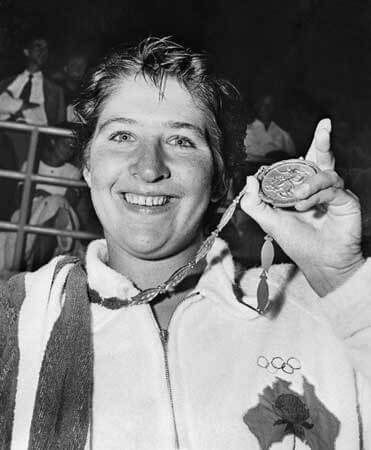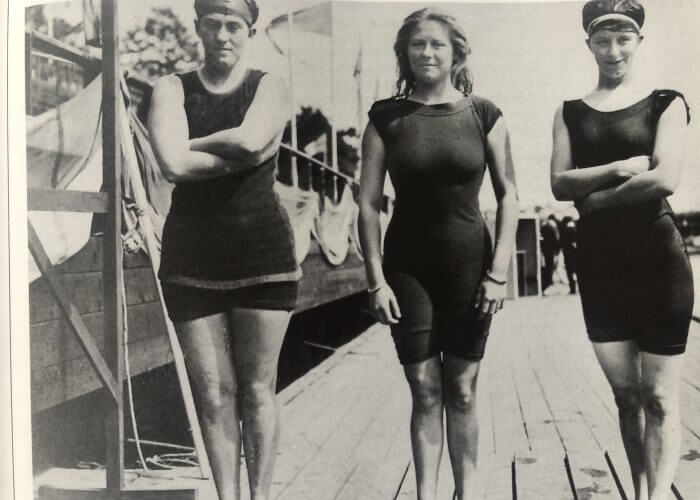League of Olympic Swim Legends: Dawn Fraser Tops 100 Free Podium With Durack & De Bruijn

What would have unfolded had Tokyo 2020 gone ahead as planned this week – and where would it all have fit in the thread of Olympic swim legends and pioneers like Dawn Fraser, Fanny Durack and Inge De Bruijn? To mark the eight days over which the Tokyo 2020 Olympic Games would have unfolded had the coronavirus pandemic not forced postponement, the team at Swimming World is filling the void with a Virtual Vision Form Guide and League of Olympic Swimming Legends.
Day 6, event 3 – Make Way for the Founder of the Triple Crown Club…
Women’s 100m Freestyle

100m gold, 1960 for Dawn Fraser – Photo Courtesy: The Dawn Fraser Collection
The Podium
- Dawn Fraser (AUS)
- Sarah ‘Fanny’ Durack (AUS)
- Inge de Bruijn (NED)
The Other Finalists (Listed Alphabetically):
- Ethelda Bleibtry (USA)
- Ranomi Kromowidjojo (NED)
- Helene Madison (USA)
- Britta Steffen (GER)
- Enith Brigitha (NED)
- Our Lane 9* place goes to whoever wins the swim-off between the four women who shared Olympic gold in pairs – and given that two of them are still on the go, we shall have to wait and see 🙂 …
- Nancy Hogshead and Carrie Stensieffer (USA), 1984; Simone Manuel (USA) and Penny Oleksiak (CAN), 2016
* – in our series, we will use Lane 9 to add an athlete whose story reflects extraordinary situations of different kinds, including being deprived by those who fell foul of anti-doping rules or by political decisions or, indeed the Olympic program, as well as simple facts such as “he/she was the only other title winner who claimed gold in a WR but didn’t make out top 8 on points”
All-Time Battle Of Olympic Swim Legends Goes To Dawn Fraser
The moment the topic of the women’s 100 free comes up in Olympic discussion, one name stands out from the rest: Dawn Fraser. The Australian star was the first swimmer to win the same event at three consecutive Olympics, achieving the feat in the 100 free in 1956, 1960 and 1964. It wasn’t until 1996, when Hungarian Krisztina Egerszegi three-peated in the 200 backstroke, that she had company in the exclusive club.
A rarity in that she stayed in the sport for multiple Olympiads, Fraser was an unstoppable force over two laps of freestyle, as she became the first woman to break the minute barrier and set 11 world records during her career. She held the global standard from 1956-71. Her middle Olympic title was won by more than a second, an eternity in a sprint event.
Another Australian earned the silver medal, with pioneer Fanny Durack standing on the second step of the podium. Durack was the first female to win Olympic swimming gold, doing so at the 1912 Games in Stockholm. She was the world-record holder for eight years and may have had the chance to repeat in 1916, had the Olympics not been canceled due to World War I.
Germany’s Britta Steffen might have got the best of the Netherlands’ Inge de Bruijn for the bronze medal, her five world records elevating her high up the points scale, both in terms of the number of them and then the longevity of pioneering speed. That, however, relied on shiny suits and while Steffen was the 2008 Olympic champion and held the world record for seven years, De Bruijn came through for the touch in our legends race courtesy of her two World records and the fact that she backed Olympic gold up with Olympic silver four years later when Jodie Henry took another win for Australia.
Dawn Fraser – On Her Olympic Debut
When Dawn Fraser Founded The Triple-Crown Club
1964 Tokyo – Women 100m Freestyle – Athletes: 44 Nations: 22
- 59.5or Dawn Fraser AUS
- 59.9 Sharon Stouder USA
- 1:00.8 Kathleen Ellis USA
1:01.8 Erica Terpstra NED
1:02.2 Marion Lay CAN
1:02.4 Csilla Dobai-Madarasz HUN
1:02.5 Ann Hagberg SWE
1:02.7 Lynette Bell AUS
Date of final: October 13, 1964
Dawn Fraser made history in 1960 when she became the first woman to retain the freestyle sprint title. Her stature grew to that of national treasure four days after she clocked 1:00.0 in a 110yd race in Melbourne.
On October 27, 1962, Fraser underpinned her sporting immortality with a 59.9sec world record to qualify for the Commonwealth Games in Perth. There, on November 24, she reduced the mark to 59.5. On the last day of February, the 29th, in the 1964 leap year, Fraser swam the last world record of her career, a blistering 58.9.
Tragedy struck a couple of weeks later. Fraser was driving home from a social event at a football club with her mother, sister and a friend when her car skidded and collided with a parked truck. Mrs. Fraser was killed, Dawn’s sister was knocked unconscious and Fraser herself spent six weeks in plaster as the vertebra she’d chipped mended itself.
Incredibly, Fraser was back in shape just seven months later.
In Tokyo, Fraser equalled her Olympic record of 1:00.6 in heats and then in the first semi-final on October 12 produced the first sub-minute swim seen in Olympic waters, a 59.9.
A day later, Sharon Stouder (USA), a 15-year-old from Glendora, California, was the only true pretender to the champion’s crown. Fraser took the lead out of the blocks, led at the turn but found she had closer company coming out of it, Stouder having tumbled turned as the defending champion hand-touched and spun.
The greatest of greats have a ability to dig deep when they most need to and Fraser fought alongside the young American and then pulled away again in the closing metres to retain the title for a second time in an Olympic record of 59.5, 0.4sec ahead of the second woman ever to break the minute, Stouder. The bronze went to Stouder’s teammate Kathleen Ellis in 1:00.8, a time Fraser had sailed past four years earlier with a 1:00.2 World record in Sydney.
The Tokyo result was described in the US media as “Stouder’s silver behind Old Ma Fraser”. The legend was 27 and had served the role as magnet to women’s freestyle speed for more than a decade.
Times were changing but not for Fraser at those Games when it came to the podium: no Advance Australia Fair in those days – God Save the Queen was what the Australian heard.
Fraser was named Australian of the Year, but just days after she had enjoyed a lap of honour in a car around Melbourne racecourse, she received a 10-year suspension by the AASU (later reduced to four years), preventing her from defending her crown at a 1968 Olympic Games that saw the 100m won in 1:00.0.
Her ‘misdemeanors’: parading at the Opening Ceremony in Tokyo against orders; stealing a flag in a midnight raid at the entrance of the Emperor’s Palace. For the latter, she was arrested and charged but not only did the Emperor pardon her, he gave her the flag as a gift.
Bureaucrats did not forgive her, however, and while her sentence was reduced on the eve of the 1968 Games, it was too late for Fraser, by then a mother, to respond. The athletes and team official who were with Fraser when she was out having fun in Tokyo were never called to account.
In 1988, Fraser was elected to the New South Wales Parliament.
The Pioneer Of Olympic 100m Freestyle Champions
1912 Stockholm – Women 100m Freestyle – Athletes: 27 Nations: 8
- 1:22.2 Sarah Durack AUS
- 1:25.4 Wilhelmina Wylie AUS
- 1:27.0 Jennie Fletcher GBR
1:27.2 Margarete Rosenberg GER
1:27.4 Annie Speirs GBR
DNS Daisy Curwen – GBR
Date of the final: July 12, 1912
Twenty-seven swimmers from eight nations became the first women ever to compete in an Olympic swimming event.

The first Olympic swimming podium for women – l-r, the pioneer champion Fanny Durack, Australia teammate Mina Wylie and Britain’s Jennie Fletcher – Photo Courtesy: ISHOF
At the helm, long before the birth of Dawn Fraser, was Fanny Durack, an Australian who, social and financial circumstances being what they were, had to fight harder to get to the Games than to win the inaugural women’s swimming crown.
In the fourth heat of the second round of racing, Durack laid down the gauntlet to Britain’s Daisy Curwen when she broke the pre-race favourite’s world record of 1:20.6 with the first sub 1:20 effort, of 1:19.8.
The semi-final completed the changing of the guard when Durack defeated Curwen, while any hope of retaliation was dashed when the British champion was rushed off to hospital for an emergency appendectomy.
On the clock, Curwen would likely have finished second. She would have been a member of the winning Britain quartet in the inaugural 4x100m freestyle relay. But it was not to be.
Durack needed only 1:22.2 to win the final and claimed her gold medal despite racing into the wall at one stage in the race. Wylie was next home in 1:25.4, while Jennie Fletcher, a member of Britain’s pioneering Olympic champion 4x100m freestyle relay quartet three days later, claimed third place by a fingernail in 1:27.0.
Fletcher, six times national champion over 100 yards freestyle from 1906 to 1912 (missing 1910) was an athlete for a time when talent counted for much in the absence of opportunity to train: a member of a poor Leicestershire family, she worked a 72-hour week in a textile factory. Fletcher told the International Swimming Hall of Fame in the 1960s:
“We swam only after working hours and they were 12 hours and six days a week. We were told bathing suits were shocking and indecent, and even when entering competition, we were covered with a floor-length cloak until we entered the water,”
And… Inge De Bruijn’s Blast at Sydney 2000:




Congratulations